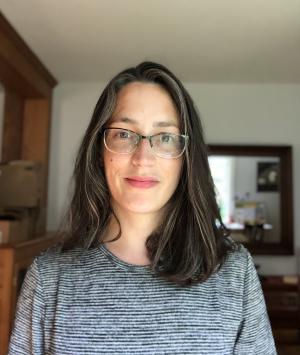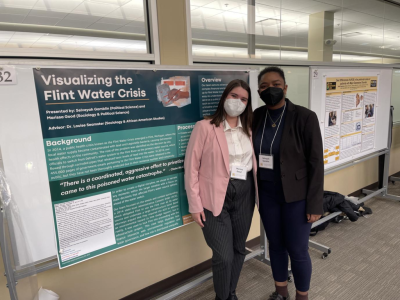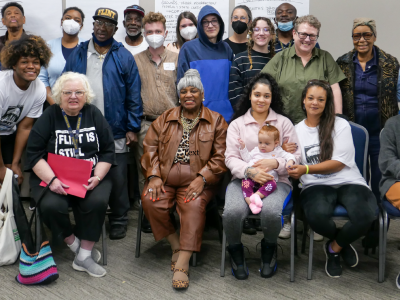Grand Research Challenge Project Spotlight
Data Justice for Flint: Seamster Leads Effort to Build Accessible Archive
For seven years, the Obermann Center at the University of Iowa has been a partner in the Mellon-funded Humanities Without Walls consortium led by Professor Antoinette Burton at the University of Illinois Urbana-Champaign. Graduate students from Iowa have attended HWW’s Career Diversity Summer Workshops, and several faculty members have worked with cross-institutional Grand Research Challenge teams. This year, we are delighted that Assistant Professor Louise Seamster (Departments of Sociology & Criminology and African American Studies) was selected as the P.I. of a team focused on "The Flint Water Disaster Public Archive."

"The Flint Water Disaster Public Archive"
The “Flint Water Disaster Public Archive” will re-home public data that has been largely inaccessible to Flint communities — a form of data justice that is of urgent relevance to the history, present, and future of those communities. The project is a collaboration among the University of Iowa, University of Michigan–Flint and the Flint Democracy Defense League.
Below is Obermann Assistant Director Lauren Burrell Cox’s interview with Louise Seamster about the project.
LC: Before we talk about your HWW project, I wanted to ask you about your previous work with the Obermann Center, especially the Book Ends program.
LS: I was lucky to have a book workshop last spring through Book Ends where I could bring my dream team of readers virtually and some great supportive mentors here to talk about my first full draft of my book manuscript, Heads I Win, Tails You Lose: Flint, Black Debt, and the Right to Infrastructure. I had been planning to finish my draft and then send it out for peer review, but I got such good feedback from the Book Ends workshop that I decided to rework it first, and I'm still doing that. I hope to have it out by early summer. It is such an important story to retell that it's not just about getting the facts correct but figuring out what order to tell them in and what the information says. Having people whose writing I loved read my manuscript was really valuable.
LC: Would you explain your HWW project?
LS: The title of the project is “The Flint Water Disaster Public Archive.” The project will re-home public data that has been largely inaccessible to Flint communities—a form of data justice that is of urgent relevance to the history, present, and future of those communities. The project is a collaboration between the University of Iowa, University of Michigan–Flint, the Flint Democracy Defense League, and We the People of Detroit.
LS: This is the first major external funding I've gotten on a project I've been working on since 2017, primarily with undergrad students. [Our goal is] to take a large, online, publicly available PDF-based archive of government emails about the Flint Water Crisis, organize and sort them, and create a new, more accessible and fully searchable website.
Ultimately, I narrowed in on the main stakeholders I was interested in, which was Flint residents and other affected communities. I knew that the archive would still be relevant to academics and policy makers and the public, but I wanted the website to be for them. That led me to move toward Humanities Without Walls as a unique opportunity for grants that were explicitly about reciprocity and building something collaboratively across multiple groups. It seemed like a great fit for us to push in this direction of thinking about what needed to be done with the data besides just putting it online. In the subhead of our grant title, we say that our project is about moving from data access to data justice.

(right) at the Iowa Student Undergraduate
Research Festival, April 2023.
(Photo by Louise Seamster)
Along the way of doing this big slow project with students, I had started doing my own research, asking what does this data actually have of interest, and I realized that there was this whole huge story nested inside these emails that you could unspool. That’s why we started collaborating with the Flint Democracy Defense League, who have been working for over a decade now, first on local politics in Michigan, and then adapted to the water crisis. They are still fighting to end Michigan's emergency management law and fighting for clean water for Flint. They wanted to help make political education tools for Flint residents because they said that most residents still don't know why the crisis happened; that aligned with our goals.
We also started talking with Callum Carr, Assistant Archivist at the University of Michigan–Flint Library. Carr said that people come in all the time asking for materials about the Flint water crisis, and they don't have much to give them. Local archivists were not collecting much during the crisis, and then the state came and got a lot of materials and brought them to their Lansing archive. That’s why in Flint, there's actually not much material on the Flint water crisis, and people are understandably frustrated by that. Our project will be a way to bring content back into the hands of Flint residents. The residents will know what matters most. They know how to tell the story in a way that relates to people, answers their biggest questions, and then builds up into a broader political understanding about who should be held responsible and what structural factors caused this to happen.
When you see archives being removed from where they originated, it changes the whole context of what the documents mean and can say. We have decided to specialize in what anthropologists call studying up, which means getting archives from people in power rather than collecting materials from Flint residents, although they're welcome to contribute. This archive shows a lot of the backstage. Usually, we just have to wonder what the bureaucrats were thinking when they did these things. The material is going to be difficult for anybody to read and will be upsetting—especially for Flint residents. So it’s important for us to be working with local people, who can help keep in the foreground how the Flint community will respond.
LC: What about your approach to the Flint Water Crisis is new?

with Seamster's lab group
LS: One thing I think about a lot is my starting point. In Summer 2017, my students and I were starting to look at the data and trying to figure out how to manage it and to keep up with what was happening in Flint. Suddenly, the state’s directions for Flint did a 180 from what everybody expected. Everyone thought that Flint was going to join this new water source that had caused it all, and then it turns out that Flint's going to stay on the water source it had been on to begin with. My students were asking me, “Why did this switch? Why can't we find anything in the news to make this story make sense from point A to point Z?” I couldn't explain it. I had no idea because there were a lot of missing parts to the story. I felt like, okay, here's something I need to try and understand. I think it was partly from starting past the supposed end of the story, that let me go back and see, well, if the crisis ended this way, what had to happen to get this to be the ending? And why is nobody paying attention to that ending?
This is just one way in which my book project is trying to take a different tack, but I think it's emblematic of a different approach overall, which is starting with questions, being comfortable asking simple questions, or often questions that seem off because nobody else is asking them.
Ultimately, it means bringing in my scholarly focus on racial politics and understanding debt—that is, understanding financial relationships and the relationships between cities and suburbs, not just focusing on Flint but considering Flint in relation to everything around it. I focus more on the political arrangements, the debt arrangements, why people wanted to build this whole other water system, why the Detroit water system was valuable, and why it gets devalued rhetorically—precisely because it's so desired. I think my core contribution as a scholar is to talk about resource flows and how people understand or misunderstand them or deny what's happening. I think that second element is the humanities’ focus, ultimately. I didn’t think when I started doing interviews that people would be using metaphors or telling these stories in ways that function as narratives, and the power that stories have in these political spaces as gossip or as warnings or as stories to guide action. It turns out these kinds of stories are all over those emails as well.
LC: It’s very validating to hear that storytelling is such a big part of things that we don't necessarily think of as storytelling.
LS: We think of local politics, infrastructure, and bonds as boring and prosaic, but narratives are everywhere there. For instance, local governments have to tell their story to the credit raters to convince them they're a city about to turn around, so you should give us more loans because we will be able to repay them. I think that, ultimately, my book is using the Flint water crisis to show how a debt instrument could cause this series of events. This has terrifying implications because you can use that story about how a place is degraded and valueless and use that to create systems that either lock-in harm or create harm.
LC: It seems like another key part of your HWW project is working with your students and your collaborators. I think that collaboration isn't always super visible in the humanities. How do you approach the collaboration?
LS: I don't think I would have started this project at all without undergrad students to work with. I was not tenure-track at the University of Tennessee at the time I started. I had no research funding. It was either scrape together bits of funding for them or do it all by myself, and it was such a big and daunting project. I found great students at Tennessee and Iowa who either had skills they were ready to apply to this project or were willing to learn for the sake of the project.
"Collaboration has been essential to this project from the beginning. It’s been absolutely fundamental to have people with different interests—from law and criminology to health, organizations, bureaucracy, and politics. They bring all these different perspectives to the project."
I think for undergraduates it's interesting because often we instructors try to find a neatly delineated task for them to do. This project is different because students are helping shape the direction and pushing us to always think, “Are we being thoughtful enough about what we're doing? What is our goal? Why are we doing this?” These questions keep me tied to why the project matters and helps students to feel ownership of the project. Our team uses dialogue all the time to state where we are, to find our problem, to figure out what to do about it.
LC: Could you explain a little bit more about how you see your project as a data justice project?
LS: Yes, we’re putting information back and making it easily accessible to Flint residents and working with Flint residents directly. It also means working to explain why the data matters and how it fits together into a story.
"I think the humanities frame helps. One of the graduate contributors to the lab quotes this phrase that all data is cooked, so there's no such thing as raw data. I think that framework has helped us to not assume that we can step outside of this and just put the information up there and walk away. Any presentation of the data will not be neutral. Our work involves theorizing and providing interpretations and analysis. We don’t just say, “I'm giving you the data and it's raw. You have to cook it.”
The residents had so much data taken from them at the beginning of the crisis.
A third way that I think that this constitutes data justice is that Flint residents were at first ignored and then eventually celebrated for practicing citizen science. They did things like learning how to do water sampling on their own. They were working with researchers, and this has become a paradigmatic example of citizen science. Ben Pauli's book, Flint Fights Back, does a good job of explaining how Flint residents were not just doing citizen science in terms of data collection at the ground level, but were also advancing a political analysis of what was happening. They were saying to everybody that this was about their state takeover through Michigan’s emergency manager law; this was about impinging on their access to their water system; that this was about stealing assets and moving toward water privatization. That part was largely ignored by the media and the rest of the country.
I've been thinking about what it means to move up from the model of citizen science in terms of collecting data on yourselves, to be able to participate in data analysis, and to have your story validated. The people in Flint were acting as political scientists, not just water scientists.
This is part of the reciprocity and redistribution plan for the project, which is the core of the project. We are also partnering with We the People of Detroit, a group of water activists who worked with a consortium of academics and researchers to assemble data and create visualizations to explain what happened with their own water crisis beginning at the same time as Flint’s. We the People modeled the creation of a community research collective. They are going to be advising us on forming a kind of analogous community research collective with folks in Flint, and on building a publication similar to what they did in Detroit. All of our efforts are united by those same goals of validating perspectives from inside Flint and pulling out the stories that are the most important to the community groups we’re working with and to the Detroit water activists. Then we can build the shared story because everybody involved has said, “We want this to be clear—that it's one story.”
LC: What is your dream outcome for this project?
LS: I want Flint residents to get justice, and I think that starts with telling the story correctly. There are ongoing lawsuits litigating accountability for this disaster, and most of the criminal cases have been dismissed at this point, but that doesn't mean that this story is over and that we're not going to be able to get justice — that’s my biggest overarching goal.
By Lauren Burrell Cox, Assistant Director, Obermann Center for Advanced Study at the University of Iowa. This story was originally published on May 4, 2023.